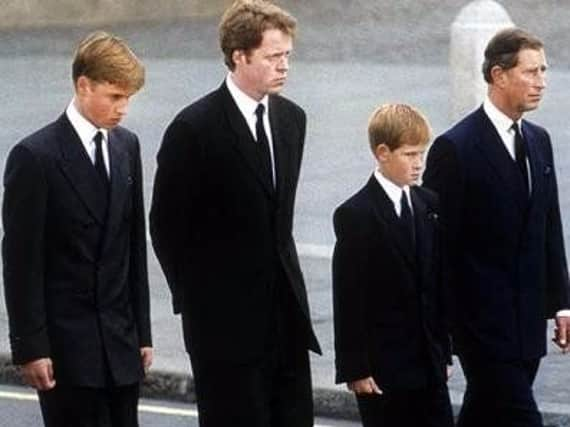Andrew Vine: Diana changed us all, but was it always for the good?


Then all of us at the funeral of Diana, Princess of Wales, realised the sound was not of rain, but of applause, a roaring tumult of clapping from the million or more people packed into central London that swept into the Abbey and for a moment drowned out everything else.
They were applauding the eulogy of Diana’s brother, Charles Spencer, which amounted to a denunciation of how his sister had been treated by the Royal Family.
Advertisement
Hide AdAdvertisement
Hide AdThat applause, and the mass outpouring of public grief, was a defining moment for Britain and the monarchy, serving notice that both had changed.
Amid the reruns of Diana’s turbulent, often unhappy, odyssey ahead of the 20th anniversary of her death on Thursday, she remains a divisive figure.
To her devotees, she was the victim of stuffy royal protocol who nevertheless gave the monarchy a shot in the arm. To her detractors, she was an out-of-control manipulator who plunged it into its worst crisis since the Abdication.
But she changed Britain, and she changed the Royal Family, even though two decades on it remains unclear whether those changes are for the better or worse. Britain’s reputation for maintaining a stiff upper lip died with Diana that August morning.
Advertisement
Hide AdAdvertisement
Hide AdThe nature of the public grief was unlike anything the country had seen before. There was an edge of hysteria to it, as people who had never seen Diana in the flesh, let alone spoken to her, wept and wailed as if she was a close relative.
When it came to a head on the day of her funeral, there was something almost frightening in its intensity. As I pushed through the crowds on my way to the Abbey, I witnessed people fainting because they were so overcome by emotion, and others throwing themselves to the ground in despair, sobbing.
The country discovered an urge for wearing its heart on its sleeve in the week between Diana’s death and her funeral. Reserve and quiet mourning were replaced by a desire to demonstrate how deeply a loss was felt, to share and vent emotion. That was a reflection of how Diana had lived. Her public displays of empathy with those who were ill or victims, and especially her willingness to expose the most intimate aspects of her life encouraged millions to do likewise.
Her example seemed to give permission for others to share their feelings without embarrassment, and the country has been doing so ever since.
Advertisement
Hide AdAdvertisement
Hide AdSo have the younger royals, especially her two sons, but it is a treacherous path for the monarchy to follow, when a touch of mystique remains central to its appeal.
William and Harry have embraced their mother’s emotional openness, speaking frankly of their own grief and making a point of campaigning on issues close to their heart. As she championed the causes of HIV/AIDS and the horrors of landmines, so they campaign on emotional difficulties in the young, citing their own struggle to come to terms with the loss of their mother when still very young and when she was only 36.
Yet it is far from certain that Diana’s touchy-feely approach to public life would have proved as durable in the long term as has the Queen’s example of quiet reserve and unswerving devotion to duty throughout the longest reign in British history.
It has been largely overlooked during the fulsome tributes to Diana that at the time of her death, questions were already being raised about the appropriateness of her behaviour and exactly what her public role should be.
Advertisement
Hide AdAdvertisement
Hide AdThe anniversary is, rightly, an opportunity to remember her as a force for good, but it should also be a moment to reflect on how the bond between monarchy and people was frayed almost to breaking point by the turbulence she caused.
Diana’s determination in the years after divorce from Prince Charles to establish an alternative, user-friendly version of royalty undermined the institution, as did her hectic social and love life.
The Royal Family learned some hard lessons from her all-too-brief life and the public backlash against it when she died, principally the need to engage more closely with the public. The way the Queen was characterised as uncaring and cold was grossly unfair. At the funeral, television cameras were not allowed to film the family as the service progressed.
The watching public could not see their faces. But from my seat in the Abbey, I could. The Queen’s face was a mask of grief and Charles wept as bitterly as his two young sons.
Advertisement
Hide AdAdvertisement
Hide AdIt took time for the monarchy to recover the public’s affection after Diana’s death.
Those who loved her most dearly need to have a care that a desire to honour her memory does not lead them to repeat her mistake of throwing back the curtain to reveal everything without any thought for the consequences.